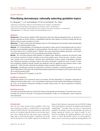 18 citations,
April 2011 in “International Journal of Molecular Medicine”
18 citations,
April 2011 in “International Journal of Molecular Medicine” Dihydrotestosterone causes p27 protein breakdown in ovarian and breast cancer cells by binding with SKP2.

Low-level laser therapy is a safe, painless method that effectively treats acne and improves skin without post-treatment care.
 1 citations,
December 2023 in “npj biofilms and microbiomes”
1 citations,
December 2023 in “npj biofilms and microbiomes” Single-cell engineered biotherapeutics show promise for skin treatment but need more research and trials.
 December 2023 in “International Research Journal of Modernization in Engineering Technology and Science”
December 2023 in “International Research Journal of Modernization in Engineering Technology and Science” Herbal hair oils help improve hair health and reduce problems like hair fall and dandruff with fewer side effects.
1 citations,
January 2013 Glucosylceramides are essential for healthy skin and proper wound healing.
 14 citations,
September 1954 in “Textile Research Journal”
14 citations,
September 1954 in “Textile Research Journal” Hair absorbs different substances from solutions based on pH levels.
 90 citations,
May 2019 in “Drugs”
90 citations,
May 2019 in “Drugs” Long-term use of azole antifungals can cause hair loss, hormonal imbalances, and severe skin reactions.
 April 2024 in “Current journal of applied science and technology”
April 2024 in “Current journal of applied science and technology” The organic hair ointment is safe, promotes hair growth in male rabbits, and has good stability and pH for human use.
2 citations,
August 2021 in “Experimental and Therapeutic Medicine” Moxibustion may help improve ovarian function by changing androgen levels.
 47 citations,
January 2001 in “Journal of Investigative Dermatology”
47 citations,
January 2001 in “Journal of Investigative Dermatology” High testosterone to epitestosterone ratio in hair could predict male-pattern baldness.
28 citations,
December 2015 in “Journal of biological chemistry/The Journal of biological chemistry” Prostasin has two roles in skin: one for normal skin development without needing activation, and another for proper hair growth that requires activation.
 5 citations,
October 2019 in “The journal of investigative dermatology/Journal of investigative dermatology”
5 citations,
October 2019 in “The journal of investigative dermatology/Journal of investigative dermatology” The research linked PLCD1 gene variants to the development of trichilemmal cysts.
 129 citations,
January 2007 in “Otology & Neurotology”
129 citations,
January 2007 in “Otology & Neurotology” Gene therapy with the Math1 gene helped regenerate balance-related cells and improve balance in mice.
 76 citations,
May 2011 in “Cell death and differentiation”
76 citations,
May 2011 in “Cell death and differentiation” A20 protein is crucial for normal skin and hair development.
 7 citations,
January 2001 in “PharmacoEconomics”
7 citations,
January 2001 in “PharmacoEconomics” The article concludes that a balance is needed between individual healthcare needs and societal resources when it comes to lifestyle drugs, with a call for compassionate policy application.
6 citations,
July 2018 in “Steroids” Testosterone changes how certain channels work in male rat reproductive tracts, affecting fertility-related fluid balance.
 18 citations,
June 2009 in “Journal of Molecular Endocrinology”
18 citations,
June 2009 in “Journal of Molecular Endocrinology” Finasteride exposure harms tadpole reproduction and hormone balance.
 December 2023 in “The journal of investigative dermatology/Journal of investigative dermatology”
December 2023 in “The journal of investigative dermatology/Journal of investigative dermatology” EAAT4 decreases with age, harming skin function and calcium balance.
 1 citations,
January 2018 in “Recent clinical techniques, results, and research in wounds”
1 citations,
January 2018 in “Recent clinical techniques, results, and research in wounds” Using developmental signaling pathways could improve adult wound healing by mimicking scarless embryonic healing.
13 citations,
December 2017 in “Stem cells” Low-dose radiation affects hair stem cell function and survival by changing their genetic material's structure.
 10 citations,
June 2016 in “Wound Repair and Regeneration”
10 citations,
June 2016 in “Wound Repair and Regeneration” The microenvironment, especially mechanical forces, plays a crucial role in hair growth and could lead to new treatments for hair loss.
 September 2014 in “Aktuelle Dermatologie”
September 2014 in “Aktuelle Dermatologie” The symposium concluded that environmental factors significantly contribute to skin aging.
 34 citations,
September 2013 in “Urology”
34 citations,
September 2013 in “Urology” Long-term use of a certain medication can worsen erectile function in aged rats by damaging penile muscle cells.
 4 citations,
April 1955 in “Textile Research Journal”
4 citations,
April 1955 in “Textile Research Journal” The effectiveness of reducing agents on hair fibers depends on their electrode potentials.
 November 2023 in “Cureus”
November 2023 in “Cureus” Magnetized saline water lotion increased hair growth in men with hair loss.
 3 citations,
August 2014 in “Journal of The European Academy of Dermatology and Venereology”
3 citations,
August 2014 in “Journal of The European Academy of Dermatology and Venereology” Dutch dermatologists prioritized skin conditions like melanoma and psoriasis for guideline development, focusing on consistent care over cost or death rates.
 15 citations,
January 2016 in “Sustainable development and biodiversity”
15 citations,
January 2016 in “Sustainable development and biodiversity” Using PGPR as biofertilizers can improve soil health and plant growth while reducing reliance on synthetic fertilizers.
 September 2023 in “International Journal of Applied Pharmaceutics”
September 2023 in “International Journal of Applied Pharmaceutics” The formulated gel is a promising treatment for alopecia areata.
 76 citations,
August 2018 in “International Journal of Cosmetic Science”
76 citations,
August 2018 in “International Journal of Cosmetic Science” Dermal Papilla cells are a promising tool for evaluating hair growth treatments.
 24 citations,
July 2017 in “Structure”
24 citations,
July 2017 in “Structure” FGF9 controls which receptors it binds to through a process where two FGF9 molecules join, and changes in FGF9 can lead to incorrect receptor activation.

























